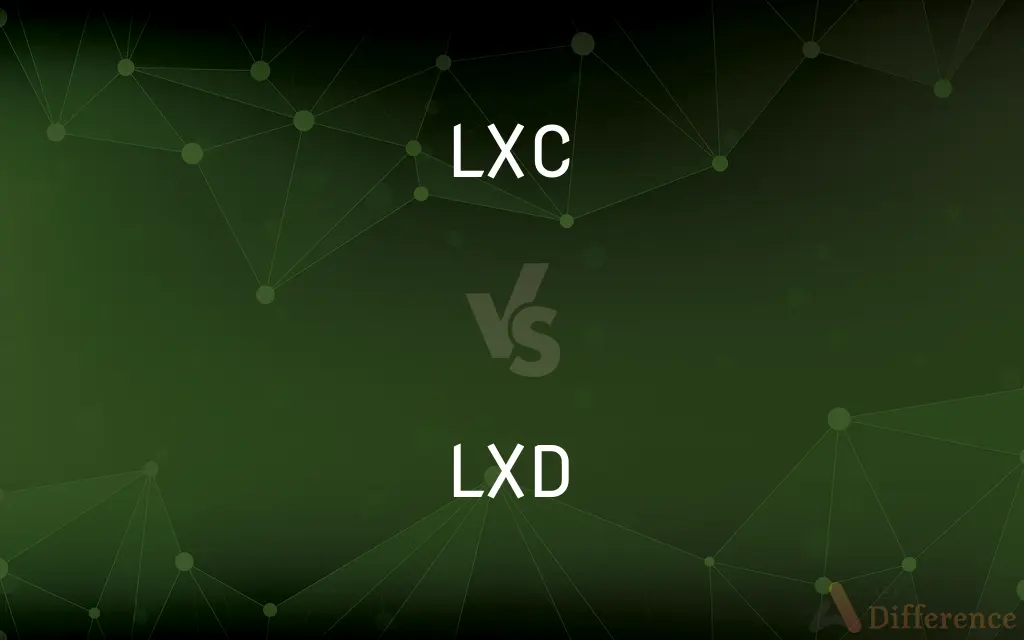LXC vs. LXD — What's the Difference?
By Tayyaba Rehman — Published on January 16, 2024
LXC is an operating-system-level virtualization method for running multiple isolated Linux systems on a single host. LXD is a daemon that provides a user-friendly interface to manage LXC, offering enhanced features like a REST API and improved security.

Difference Between LXC and LXD
Table of Contents
ADVERTISEMENT
Key Differences
LXC (Linux Containers) is a lightweight virtualization technology that allows for the creation and management of containers, which are isolated environments running their own applications and processes. LXD is built on top of LXC and acts as an extended daemon, providing a more user-friendly and powerful system for managing LXC containers.
LXC focuses on providing a simple, low-level user interface for directly managing containers, similar to virtual machines but with less overhead. It's more about the container technology itself. In contrast, LXD offers an enhanced experience with features like easy storage management, network management, and a REST API for remote control.
From a technical standpoint, LXC is like a traditional command-line tool for Linux container management, providing basic container functionality. LXD, on the other hand, is designed as a long-running daemon and provides a command-line tool called lxc (not to be confused with LXC itself) with higher-level and more user-friendly commands.
LXD also offers better security features than LXC, such as unprivileged containers, which reduce the risk of container escapes. It is considered more suitable for larger-scale deployments due to its scalability and enhanced management features.
While LXC can be used independently for creating and managing containers, LXD is often preferred for its ease of use, advanced features, and robust management capabilities, especially in a production environment.
ADVERTISEMENT
Comparison Chart
Nature
Low-level container management technology
Extended daemon providing a more user-friendly interface
User Interface
Basic command-line tools
Advanced command-line tools with REST API
Primary Use
Direct container management
Enhanced management of LXC containers
Security
Standard container security
Advanced security features like unprivileged containers
Suitability
Ideal for simple, individual container management
Better for large-scale deployments and ease of management
Compare with Definitions
LXC
Suitable for running isolated Linux systems.
We deploy different applications in separate LXC containers for security.
LXD
Provides enhanced security and scalability.
For our production environment, we prefer LXD due to its robust security model.
LXC
Can be used independently for containerization.
Developers often use LXC for local development environments.
LXD
A daemon for managing Linux Containers (LXC).
LXD simplifies the process of managing and deploying LXC containers.
LXC
A lightweight virtualization technology.
We use LXC to create isolated testing environments on our server.
LXD
Offers a user-friendly command-line interface.
We manage our containers using the advanced features of LXD's CLI.
LXC
Provides operating-system-level virtualization.
LXC allows running multiple Linux distributions on the same host.
LXD
Includes a REST API for remote management.
We integrate our CI/CD pipeline with LXD using its REST API.
LXC
Focuses on low-level container management.
LXC offers basic commands for managing container resources.
LXD
Ideal for large-scale container deployments.
Our cloud infrastructure utilizes LXD for scalable container orchestration.
Common Curiosities
What is LXC?
LXC is a Linux containerization technology for creating and managing isolated environments.
Can LXD manage non-Linux containers?
No, LXD is specifically designed for managing Linux containers.
What is LXD?
LXD is an extended daemon built on LXC, providing advanced management features for containers.
Can I use LXD without LXC?
No, LXD is built on top of LXC and relies on it for containerization.
How does LXD enhance container management?
LXD provides a simpler interface, REST API, and tools for scalable management.
How does LXD differ from LXC?
LXD offers a more user-friendly and feature-rich interface for managing LXC containers.
Do LXD and LXC support all Linux distributions?
They support most distributions, but compatibility should be checked.
Is LXC suitable for production environments?
While possible, LXD is often preferred in production due to better management and security.
What are the security benefits of LXD over LXC?
LXD offers advanced security features like unprivileged containers, reducing risks.
Can I migrate containers from LXC to LXD?
Yes, LXD supports importing existing LXC containers.
Are LXC containers isolated from the host system?
Yes, LXC containers are isolated, though LXD provides enhanced isolation.
Does LXD require more resources than LXC?
Due to its additional features, LXD might require slightly more resources.
Is there a graphical interface for LXD?
LXD primarily uses a command-line interface, though third-party GUIs are available.
Is LXC easy to use for beginners?
LXC can be complex; LXD is generally more user-friendly.
How do LXC and LXD handle networking?
Both provide networking capabilities, but LXD offers more advanced options.
Share Your Discovery

Previous Comparison
Cost Center vs. Cost Unit
Next Comparison
Clarified Butter vs. GheeAuthor Spotlight
Written by
Tayyaba RehmanTayyaba Rehman is a distinguished writer, currently serving as a primary contributor to askdifference.com. As a researcher in semantics and etymology, Tayyaba's passion for the complexity of languages and their distinctions has found a perfect home on the platform. Tayyaba delves into the intricacies of language, distinguishing between commonly confused words and phrases, thereby providing clarity for readers worldwide.












































